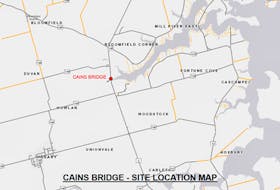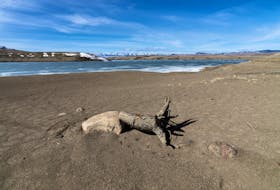ST. JOHN'S, N.L. — Environmental groups say the federal government’s $320-million cash injection in the province’s offshore doesn’t sit well given findings in a report by the Department of Fisheries and Oceans (DFO) science branch published last month.
The report was a review of a draft version of the regional assessment (RA) of the province’s offshore exploratory drilling. That assessment was published in February, and led to a new regulation that allows exploratory drilling projects to proceed without further environmental assessment or public input as long as they meet a set of minimal requirements.
The Impact Assessment Agency of Canada has said the objective of the RA was to improve the efficiency of the assessment processes of offshore projects while maintaining a high standard of environmental protection.
However, DFO Science’s review found that information used in the assessment was incomplete and outdated, adversely affecting reliability and credibility to an extent that could affect the appropriateness of the assessment’s recommendations.
The Ecology Action Centre, the Sierra Club Canada Foundation and the World Wildlife Fund (WWF) Canada issued a joint news release last week.
“While the Government of Canada has accepted the RA, many of the concerns raised in the DFO report appear not to have been addressed,” the release said.
“The report written by DFO experts should be alarming to anyone with an interest in protecting Atlantic Canada’s offshore environment,” said Jordy Thomson, senior marine co-ordinator with the Ecology Action Centre.
“An exemption regulation based on such a flawed use of science should not be allowed to stand.”
DFO Science also said in its report that a thorough and detailed review of the regional assessment was difficult to undertake in the short review period of 30 days.
That comment echoes concerns of environmental groups. The Ecology Action Centre, Sierra Club and WWF-Canada all criticized the rushed process of the regional assessment, noting it was completed in less than a year despite covering an offshore area larger than Alberta.
“We see that the decisions that have been made most recently about the funding that would be provided to spur exploration in Newfoundland and Labrador’s offshore as an extension of the poor decision-making that was evident with the finalization of the regional assessment, and the loophole regulation that was created based on the regional assessment that allows the broad exemption of future offshore exploratory drilling in the region,” said Sigrid Kuehnemund, WWF-Canada’s vice-president of wildlife and industry.
Kuehnemund said WWF-Canada would have liked to see those federal funds used to support oil and gas workers by pivoting toward employment for them in renewable technology and green initiatives.
She noted just last month WWF-Canada released its Living Planet Report Canada which showed that species of national conservation concern are declining at an alarming rate.
“The ways that Canada can protect its wildlife is through strong environmental legislation,” she said.
Kuehnemund said that’s why WWF-Canada, along with the Ecology Action Centre and Sierra Club Canada Foundation, are currently taking the federal government to court, seeking to have the regional assessment reopened to be completed to a higher standard, and to have the exemption regulation rescinded.









